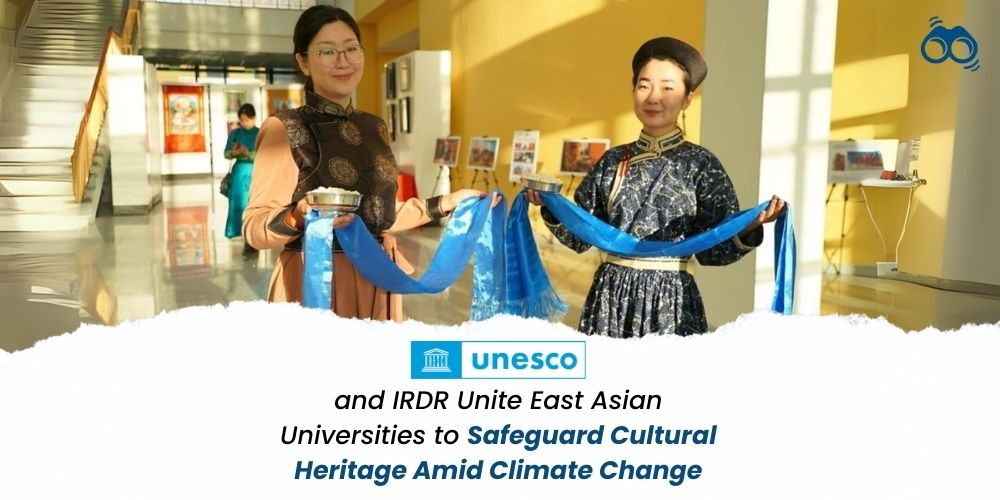Interdisciplinary Research Paves the Way for Heritage Protection in a Changing Climate
Experts Unite to Strengthen Climate Resilience Through Cultural Heritage Preservation
The meeting on "International Cooperation for Climate Change," held in Hangzhou, China, represented a significant milestone in global efforts to tackle climate-related challenges. Organised by UNESCO and the Integrated Research on Disaster Risk (IRDR), the event provided an invaluable platform for experts and scholars from ten East Asian universities to exchange insights and collaborate on innovative solutions.
Furthermore, as part of the 2025 Disaster Prevention and Mitigation Conference, participants explored the intersection of culture and disaster risks, recognising its vital role in shaping effective climate resilience strategies. By fostering interdisciplinary dialogue and integrated research, the gathering helped advance a more comprehensive approach to addressing climate change's complex impacts. During the discussions, Shahbaz Khan, Director of UNESCO’s Regional Office for East Asia, stressed the need for enhanced international collaboration and local knowledge integration to safeguard cultural heritage against climate threats. In addition, Yu Yong, Vice President of CADP, reaffirmed the organisation’s commitment to global disaster reduction and shared China’s expertise on cultural heritage and climate change.
Similarly, Marco Toscano-Rivalta, Chief of UNDRR’s Regional Office for Asia and the Pacific, underscored the importance of multi-hazard response strategies and localised approaches, warning that cultural heritage is increasingly at risk due to climate change. As the meeting progressed, East Asian university representatives presented research findings on climate change, cultural heritage, and local communities. For example, Li Min from Ritsumeikan University in Japan highlighted the climate threats faced by World Heritage sites and advocated for adaptation strategies incorporating traditional culture. Likewise, Otgonpurev Sukhbaatar from the Mongolian University of Life Sciences examined the effects of climate disasters on pastoral communities and discussed their resilience-building practices.
Additionally, Kei Kano from Shiga University in Japan showcased innovations that integrate traditional knowledge with green technology for climate mitigation. Meanwhile, Lai Weihong from Beijing Normal University in China explored how folklore influences risk perception and post-disaster recovery, underscoring culture's significance in disaster response.
Experts also introduced advanced tools and collaborative frameworks for heritage protection. Notably, Tian Bingwei from Sichuan University in China showcased disaster monitoring and early warning systems designed to safeguard heritage sites. Along similar lines, Donghyun Kim from Jeonju University in South Korea explained how sprinkler systems and fireproof materials contribute to wildfire protection. Furthermore, Dong Wei from Southeast University in China emphasised the role of 3D digital archiving and emerging technologies in post-disaster restoration. At the same time, Ye Tao from Beijing Normal University in China highlighted the importance of interdisciplinary research and international cooperation in strengthening heritage protection amidst climate change.
In the subsequent session, participants engaged in discussions on integrating cultural studies with disaster risk management. They collectively agreed that interdisciplinary research and global collaboration are crucial for safeguarding cultural heritage and mitigating disaster risks. Moreover, experts identified a significant communication gap between scientists and the public, calling for localised, culturally relevant risk communication strategies. By tailoring messages to specific cultural contexts, these approaches could enhance community engagement and improve public awareness of disaster risks and climate resilience.
During the final plenary discussion, experts from UNESCO and IRDR outlined four key research priorities to reinforce cultural heritage resilience in the face of climate change. Firstly, the priority of "cultural heritage assessment of vulnerability and resilience" aims to refine risk evaluation methods by integrating socio-economic and community perspectives while aligning heritage protection with climate adaptation strategies.
Secondly, "bridging traditional and scientific knowledge" seeks to assess indigenous practices, establish co-production frameworks, and address policy challenges hindering the incorporation of local wisdom into climate initiatives. Thirdly, "technologies for heritage monitoring" encourages the use of AI, IoT, and remote sensing for real-time documentation while promoting ethical data governance and community-driven tools.
Lastly, "the role of culture in climate action" explores how heritage-based education, grassroots movements, and policy integration can enhance resilience. Collectively, these research priorities are expected to guide future collaborative efforts, emphasising interdisciplinary approaches, equitable partnerships, and scalable solutions.
The UNESCO Regional Office for East Asia remains committed to strengthening multi-stakeholder collaboration through research, capacity-building workshops, and knowledge exchange initiatives, further solidifying culture's pivotal role in climate resilience.
Editor's Note
As climate change continues to pose unprecedented threats to cultural heritage, international cooperation and interdisciplinary research have become essential in addressing these challenges. This initiative, led by UNESCO and IRDR, marks a significant step toward integrating cultural studies with disaster risk management. By fostering collaboration among experts, scholars, and policymakers it encourages the development of innovative solutions that blend scientific advancements with traditional knowledge. Moreover, the emphasis on risk communication and community-driven approaches will help bridge the gap between researchers and the general public, ensuring that heritage protection strategies are both accessible and effective. The outlined research priorities—spanning vulnerability assessment, technological advancements, and policy integration—provide a clear framework for future efforts. These collaborative endeavours will strengthen cultural resilience and empower communities to safeguard their heritage in the face of climate-related uncertainties.
Skoobuzz believes that through continued dedication and global partnerships, this initiative has the potential to drive meaningful change, ensuring that cultural heritage remains protected for generations to come.














0 Comments (Please Login To Continue)